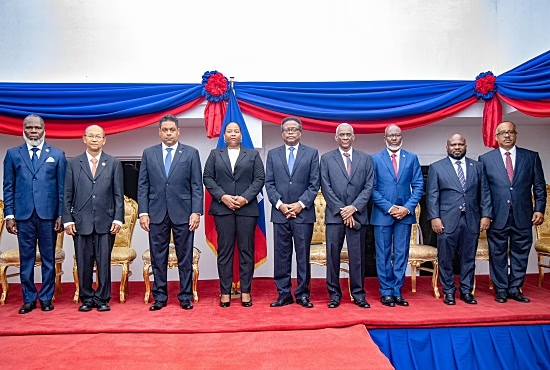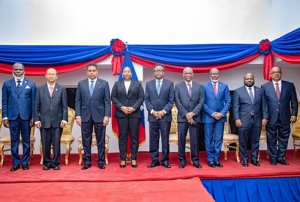The President of Haiti’s Transitional Presidential Council (CPT), Laurent Saint-Cyr, formally declared on Wednesday his strong opposition to any attempt to remove Prime Minister Alix Didier Fils-Aimé, warning fellow council members of the risks of plunging the country into an institutional crisis less than two months before the February 7, 2026 transition deadline.
In a two-and-a-half-page internal memo written in stark and urgent language, Saint-Cyr reported that “maneuvers intensified in recent days” appear aimed at forcing a change in government leadership. He condemned these initiatives, saying they have “disrupted the serenity essential to the proper functioning of the Council” and “pose a serious threat to the country’s stability.”
According to the CPT coordinator, such a high-risk shake-up “would deal a severe blow to ongoing efforts to restore security and organize elections.” He stressed that these maneuvers have “raised legitimate concerns among our international partners” and sparked “genuine anxiety within public opinion.”
The push to replace the Prime Minister has already resulted in sanctions against one of its key architects, Counselor-President Fritz Alphonse Jean. He was recently sanctioned by the U.S. government, which accuses him of supporting criminal gangs and obstructing Haiti’s efforts to combat “terrorist gangs.”
Accusations Rejected by Fritz Jean
“As soon as we began considering the possibility of changing the head of government, Council members received threats of visa cancellations and other sanctions,” said the former central bank governor. He claimed that explicit warnings were issued by U.S. and Canadian diplomats to members of the CPT.
President Saint-Cyr, who opposes the removal of Prime Minister Fils-Aimé, justified his stance by invoking “the higher interest of the Nation” and the need to “rise above our differences” in order to serve “the collective good.” While acknowledging that “some adjustments can always be considered to reinvigorate government action,” he firmly rejected “any major upheaval of the institutional balance.”
“I cannot support a drastic shift that would further weaken an already strained institution and endanger the minimum stability required for the responsible completion of the transition,” he wrote.
Saint-Cyr highlighted the “significant progress” achieved under his coordination, citing “advances in restoring security, ongoing dialogue with political parties, the allocation of necessary funds for the electoral process, and the preparation of the electoral decree and timetable.”
He said that “small but meaningful security gains” are beginning to take shape thanks to “joint efforts by the Prime Minister’s Office and the Presidency,” particularly through the deployment of the Anti-Gang Repression Force (FRG).
A Solemn Call for Unity
In a forceful appeal, Laurent Saint-Cyr urged “calm, dialogue, collaboration, and unity” as the country faces “a decisive period that could lead to cascading crises.” He reaffirmed his commitment to “stability, the rigor that must guide public action, the unwavering fight against insecurity, and the independence of the Provisional Electoral Council.”
This confrontation comes as Haiti’s transition approaches its theoretical conclusion on February 7, 2026. Saint-Cyr’s firm stance — stating he “does not associate himself with these efforts” to topple the government — highlights deep divisions within the CPT and the mounting difficulty of maintaining a steady course in the crucial period leading up to elections.
“Haiti deserves responsible, clear-headed, and courageous leadership, fully devoted to the public interest,” Saint-Cyr concluded.








